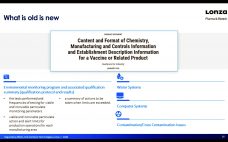Demand for drugs and therapeutics is growing thanks to the globalization of pharmaceutical-based medicine. Manufacturing new drugs and getting them to market faster, more economically and safely demands development strategies and business models that support successful outcomes for both investors and patients. Outsourcing has become an increasingly attractive business model for pharma as companies seek partners who can deliver comprehensive end-to-end drug substance and drug product development. It has prompted contract manufacturing organizations (CMOs) to consolidate and expand to create…
Author Archives: BPI Contributor
Efficient and Rapid Purification of E. coli Expressed Toxin Recombinant Protein Fragments
This webcast features: Andrew Lees, PhD, Founder and Scientific Director, Fina Biosolutions, LLC Tetanus toxoid (TT) is frequently used as a carrier protein for conjugate vaccines. TT contains strong T cell epitopes. They are toxoided protein and are not a uniform product because of specific toxoiding and purification processes. TT tends to aggregate with age and is not affordable to produce in quantities for research and early clinical work. TT heavy chain fragment C (rTTHc) is the C terminal fragment…
Manufacture of CRISPR RNPs for Clinical Use
Shawn Shafer, PhD, genome editing platform lead, Aldevron Shafer spoke about manufacturing ribonucleoproteins (RNPs) for clustered regularly interspaced short palindromic repeats (CRISPR) for clinical applications. CRISPR RNP consists of a guide RNA (sgRNA) complex with the CRISPR-associated protein 9 (Cas9). The Cas9 protein is complexed with the guide RNA as it associates with the genomic DNA. Once the guide RNA is aligned with the complementary genomic DNA sequence, the catalytic nucleus domains cleave the genomic DNA, creating a double-stranded break…
Technology Integrators in Cell and Gene Therapy: Powering Innovation
Julien Meissonnier, vice president and chief scientific officer, Catalent Meissonnier shared information about the expanded role of contract development and manufacturing organizations (CDMOs) in cell and gene therapies (CGTs). Catalent entered the gene therapy space in 2019 through acquisition of Paragon BioServices, adding expertise in adenoassociated viruses (AAVs) and viral vector manufacturing. Cell therapy capabilities were acquired early in 2020 through acquisition of MaSTherCell, with the goal of providing end-to-end integrated solutions to CGT customers. In addition to expertise in…
Development of an Advanced Gene Therapy Platform
Steve Pincus, PhD, head of science and innovation, Fujifilm Diosynth Biotechnologies Fujifilm Diosynth Biotechnologies (FDB) is a contract development manufacturing organization (CDMO) with four sites in the United Kingdom, Denmark, and the United States (Research Triangle Park, NC, and College Station, TX). The sites in Denmark, the United Kingdom, and North Carolina specialize in proteins and monoclonal antibodies (MAbs) with capabilities up to 20,000 L. The Texas site works primarily on virus-based therapies and was founded by Texas A&M University…
Meeting Regulatory Requirements for Cell and Gene Therapy Manufacturing
Karen Magers, head of regulatory affairs, cell and gene technologies; and Rajesh Thangapazham, head of regulatory strategy, cell and gene technologies, Lonza Pharma and Biotech Magers began with an overview of the complex regulations and guidance applicable to makers of cell and gene therapies. A slide illustrated the development timeline of such therapies and their associated regulations and guidance documents. That framework continues to evolve through revision of documents and guidelines as more information is gained about the technologies and…
Accelerating Clinical Development and Commericalization with a Lentiviral Vector Platform Manufacturing Process for Cell Therapy
Kevin Beck, senior manager, Miltenyi Biotec Beck’s presentation highlighted developments within Miltenyi subsidiary Lentigen Technology, a contract development and manufacturing organization (CDMO) that specializes in lentivirus (LV)-vectored cell therapy products. Lentigen’s original facility in Gaithersburg, MD, occupies 40,000 ft2 and features two ISO 7–compliant cleanrooms for lentivirus vector platform production, both of which comply with EU and US good manufacturing practice (GMP) guidelines. The company manufactures 80 lots/year but plans to boost manufacturing by launching a similarly equipped site in…
Stainless-Steel and Single-Use Systems: Observations from COVID-19
Justin Carbungco, associate director, small-scale commercial manufacturing, Samsung Biologics Carbungco began with what he described as a lingering question: Which is better, single use or stainless steel? He focused on cost comparisons for stainless-steel and single-use systems, including some factors for companies considering clinical and contract manufacturing. Implementation of single-use systems is estimated to grow to ~US$33 billion by 2027. The year-end growth rate as of 2020 will be about 10.85%. For biopharmaceutical manufacturers, most single-use systems are implemented at…
Get to IND Faster: Accelerated, High-Performance Cell-Line Development
John Gill, director of cell-line development, Samsung Biologics Samsung Biologics has expanded its capabilities with a goal of providing end-to-end biomanufacturing solutions. The company has offered both drug-substance (DS) and drug-product (DP) manufacturing services since its inception. Across three sites in South Korea, the company offers 364,000 L of bioreactor capacity, including units for n – 1 perfusion cell culture. To those capabilities Samsung has added contract research support for biosafety testing, standalone quality control (QC) services, and a novel cell-line development…
An Innovative, Closed, CAR T-Cell Therapy Platform Process to Streamline Manufacturing Approaches with Great Predictability
Tatiana Golovina, senior director, cell therapy process development, WuXi Advanced Therapies Golovina described recent developments at WuXi Advanced Therapies, a unit within WuXi AppTec that specializes in developing and manufacturing cell and gene therapies (CGTs). Until recently, the Advanced Therapies business operated over three sites at the US Navy Yard in Philadelphia, PA. Those facilities focus on CGT clinical manufacturing, commercial manufacturing for autologous and allogeneic cell therapies, and late-stage and commercial production of viral vectors and gene-mediated cell therapies,…










